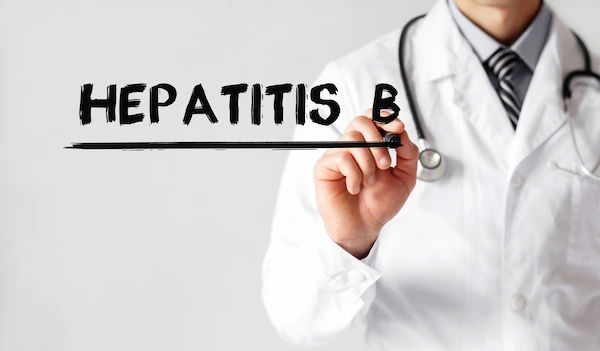Hepatitis B: Causes, Symptoms And Treatment Of Hepatitis B
Learn about the causes, symptoms, and treatment options for Hepatitis B. Understand how this viral infection affects the liver and the steps you can take for prevention and management.

Written by Dr.Sonia Bhatt
Last updated on 3rd Jul, 2025

Hepatitis B virus infects the liver, instigating inflammation in its tissues—this is what "hepatitis" refers to. It often starts as a temporary (acute) infection but, in some cases, can progress to a long-lasting (chronic) condition that remains in the body permanently.
Over time, ongoing inflammation can cause significant harm to the liver, potentially resulting in cirrhosis or liver failure. Similar to other chronic liver diseases, hepatitis B can progress silently, often without noticeable symptoms. As a result, many people remain unaware that they are infected.
Potential Cause and Transmission of Hepatitis B
Hepatitis B is an infection caused by the hepatitis B virus (HBV). It spreads when an individual comes into contact with the blood, semen, or other bodily fluids of a person who is infected. This can happen through various routes, such as unprotected sexual activity, sharing needles or syringes, or from mother to baby during childbirth. The virus does not spread through casual contact like hugging, sharing food, or coughing. Once inside the body, the virus targets the liver, potentially causing both acute and chronic disease.
Who is at greater risk of contracting hepatitis B?
While anyone can contract hepatitis B, certain groups face a higher risk:
Babies born to mothers with hepatitis B.
People who use injectable drugs or share needles, syringes, or other drug-related equipment.
Sexual partners of individuals with hepatitis B, particularly if they do not use latex or polyurethane condoms during intercourse.
Men who have sex with men.
Those who live with someone infected with hepatitis B, especially if personal items like razors, toothbrushes, or nail clippers are shared.
Healthcare and public safety professionals who are exposed to blood at work.
Patients undergoing haemodialysis.
Individuals who have lived in or frequently travel to regions where hepatitis B is widespread.
People with diabetes, hepatitis C, or HIV.
Symptoms of Hepatitis B
Symptoms can vary from mild to severe and typically develop between one and four months after being infected with the virus. In some cases, symptoms may appear as early as two weeks after exposure. However, many people—especially young children—may show no symptoms, whether the infection is acute or chronic.
Common signs and symptoms of hepatitis B include:
Abdominal pain
Dark urine
Fever
Joint pain
Loss of appetite
Nausea and vomiting
Fatigue
Jaundice
Diagnosis of Hepatitis B
To diagnose hepatitis B, a healthcare professional will ask about your symptoms and conduct a physical examination. They may inquire about your medical history, including any family history of liver disease or factors that could increase your risk of contracting hepatitis B.
Because many people with hepatitis B experience no symptoms or have no known risk factors, the only way to confirm the infection is through blood tests. These tests can provide critical information, such as:
Whether the infection is acute or chronic.
If you have been infected in the past.
Whether you have developed immunity to the virus.
If the infection is affecting your liver function.
Following the diagnosis, additional tests may be needed to assess the liver’s health. In some cases, a liver biopsy, where a small sample of tissue is taken and analysed in the laboratory, may be recommended.
Blood tests, known as a hepatitis viral panel, are typically used to identify:
A recent infection.
An active, long-term infection.
A past infection that is no longer active.
If you have chronic hepatitis B, further tests to check for liver damage might include:
Albumin levels: To measure the amount of protein produced by the liver.
Liver function tests: To assess the working of liver
Prothrombin time: To assess your blood’s ability to clot.
Other specialised blood tests to determine the extent of liver scarring.
Your doctor may also recommend a test to measure the amount of hepatitis B virus in your blood (viral load), which helps monitor the effectiveness of treatment.
Imaging and Screening
Imaging tests, such as ultrasounds or MRIs, are often used to gain a clearer understanding of liver health. Additionally, screening may be advised for adults without symptoms to ensure early detection and management.
Treatment Options for Hepatitis B
The treatment for hepatitis B depends on the stage and nature of the infection. Your healthcare provider will tailor your treatment plan based on your specific condition.
Preventative Treatment: If you or your child have recently been exposed to hepatitis B, your healthcare provider may recommend preventive treatments to stop the infection from developing. These treatments include:
Vaccination: If you haven’t been vaccinated, an initial dose of the hepatitis B vaccine should be given, ideally within 24 hours of exposure. You will need two additional doses over the following six months to complete the vaccination schedule.
Hepatitis B Immune Globulin (HBIG): HBIG is a preparation made from human blood, containing antibodies against hepatitis B. It is given as an injection to prevent infection after exposure.
These treatments are especially effective in preventing new-borns and mothers with chronic hepatitis B from becoming infected. Babies who receive these treatments shortly after birth generally have a good prognosis and can breastfeed safely.
1. Acute Treatment: There is no specific medication for acute hepatitis B, and many individuals will not need treatment. However, those with severe symptoms may require monitoring for complications and supportive care, which can include Intravenous (IV) fluids, IV nutrition and pain relief.
2. Treatment for Chronic Infection
For chronic hepatitis B, several medications may be available, though not all are suitable for every individual. Your healthcare provider will recommend the best treatment based on your condition and risk factors. The treatment plan may include:
Surveillance: Regular check-ups and tests, ideally every six months, to monitor liver health and detect any signs of active liver disease. Tests may include blood tests, imaging tests, and elastography (liver stiffness scan).
Medications:
Immune Modulator Drugs: Synthetic antibodies, such as peginterferon alfa-2a and interferon alfa-2b, which are given by injection over six to 12 months. These are often used for adults and as a first-line treatment for children.
Oral Antiviral Medications: Drugs like tenofovir disoproxil, tenofovir alafenamide, and entecavir are highly effective in suppressing the virus. Most people will need to take these medications for life.
3. Surgery
If chronic hepatitis leads to severe complications such as cirrhosis, liver failure, or liver cancer, surgery may be required. For cirrhosis, a partial liver resection can be performed, as the liver can regenerate if sufficient healthy tissue remains. In cases of severe damage, a liver transplant may be necessary.
Ways of Reducing the Risk of Hepatitis B Infection
You can reduce your risk of getting hepatitis B by:
Practising Safe Sex: Use a latex or polyurethane condom if unsure of your partner's infection status.
Avoiding Shared Items: Do not share personal items like razors, toothbrushes, or needles.
Preparing for Travel: If travelling to areas with higher hepatitis B rates, get vaccinated beforehand.
Prophylactic Treatment: If exposed, get the vaccine and hepatitis B immune globulin (HBIG) within 24 hours to reduce infection risk.
Vaccination Recommendations:
Vaccination is the best way to prevent hepatitis B. It involves three doses over about six months and provides long-term protection.
Babies: First dose at birth, completing the series by 6 to 18 months.
Children under 19: Should catch up if not previously vaccinated.
High-Risk Groups: Healthcare workers and those living with hepatitis B patients should get the vaccine.
New-borns of Infected Mothers: Receive a special vaccine within 12 hours of birth.
HBIG and the vaccine given within 24 hours of exposure can prevent infection. Avoiding contact with blood and bodily fluids is also essential in preventing transmission.
Lifestyle Adjustments
Whether or not you are on medication, it is essential to protect your liver by maintaining a healthy lifestyle. Healthcare providers generally advise avoiding alcohol and eating a balanced diet. Alcohol, along with factors like a high BMI and raised triglycerides, can aggravate liver inflammation. Reducing alcohol intake and limiting sugar and fat can help minimise further liver damage.
Conclusion
Acute hepatitis B typically resolves in 2 to 3 weeks, with liver function returning to normal in 4 to 6 months. New-borns and half of infected children often develop chronic hepatitis B, while few adults do not. Most people recover from hepatitis B without lasting issues, but chronic infection can lead to liver damage (cirrhosis) and increase the risk of liver cancer. Those with chronic hepatitis B should be monitored in specialist clinics, and treatment can help prevent complications. It’s crucial to maintain regular contact with gastroenterologist or hepatologist to monitor the progression of the disease and getting guidance on treatment and self-care.
Consult Top Hepatologists
Consult Top Hepatologists

Dr. Srinivasa Reddy
Hepatologist
12 Years • MBBS, MD (General Medicine), DM (Hepatology),ASGE
Hyderabad
Myra Liver & Gastro Care, Hyderabad

Dr. E Prabhakar Sastry
General Physician/ Internal Medicine Specialist
40 Years • MD(Internal Medicine)
Manikonda Jagir
Apollo Clinic, Manikonda, Manikonda Jagir
(125+ Patients)

Dr. Aakash Garg
Gastroenterology/gi Medicine Specialist
12 Years • MBBS, DNB (Medicine), DrNB (Gastroentrology).
Bilaspur
Apollo Hospitals Seepat Road, Bilaspur
(125+ Patients)

Dr. Aswin S. Krishna
Hepatologist
10 Years • MBBS, MD (Internal Medicine,MMC), DM (Hepatology, MMC), PDF(Fellowship in Liver Transplanatation)
Chennai
Apollo Hospitals Greams Road, Chennai
(100+ Patients)

Dr Amey Sonavane
Gastroenterology/gi Medicine Specialist
11 Years • "MBBS, DNB (Internal Medicine) DNB (Gastroenterology) "
Mumbai
Apollo Hospitals CBD Belapur, Mumbai
(75+ Patients)
